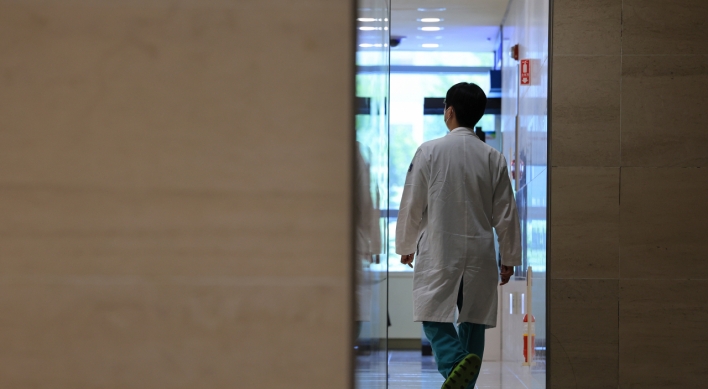Textbook controversy spills over to selection of authors
By Yoon Min-sikPublished : Dec. 15, 2015 - 09:31
With the government postponing the announcement of the criteria for government-issued history textbooks for the third time Monday, the dispute over the selection of authors fueled the debate over the plan that the Park Geun-hye administration had vowed to keep transparent.
The National Institute of Korean History, in charge of the publication process of the history textbook, is unclear on when it will reveal the criteria, the Education Ministry said.
The NIKH initially was slated to make the announcement on Nov. 30, and delayed it to Dec. 15, which has again been pushed back. It said the criteria was still being discussed.
The delay has led to mounting criticism of the contentious policy already being slammed for its hiring process.
Most recently, Han Gyu-cheol, a professor emeritus at Kyungsung University and an expert on Korea’s ancient history, accused the NIKH of disqualifying him as an author due to his ideological background.
He said Sunday he was excluded as an author despite being invited personally by NIKH chief Kim Jung-bae.
“Kim didn’t tell me why I was later disqualified, but asked me if I had recently signed a statement denouncing the government,” said Han, formerly a member of the NIKH and consultant for the Northeast Asian History Foundation, suggesting that his progressive viewpoints may have also been a factor.
The NIKH denied the accusations, saying Kim’s invitation was not formal.
Han’s failure to qualify as an author was in stark contrast to a high school teacher named Kim Hyung-do, who had been hired as an author. Critics pointed out that Kim spent nine years teaching commerce and had only started teaching history in the first semester of this year.
Kim resigned from the authorship Thursday as the dispute escalated over his qualifications.
The main opposition New Politics Alliance for Democracy accused the government of hiring substandard authors to write a book that caters to its taste, and urged it to reveal the rest of the 47 authors. As of Monday, Kim and Shin Hyung-sik, a professor emeritus from Ewha Womans University, remain the only two names from the list that have been made public.
With the government in the hot seat over its publication process, the Education Ministry and the ruling Saenuri Party agreed on the big picture for the textbook.
The Education Ministry attempted to downplay the controversy, saying that it only involved one of the authors. But it said the ministry would intervene “if the situation got out of hand,” emphasizing that it has not yet come to such a situation.
Saenuri Party Rep. Kang Eun-hee told reporters Thursday that the new textbook would reduce the proportion of coverage of the modern period in favor of the early modern period ― from the late 14th century to late 19th century.
On the bitterly divisive issue of whether the “South Korean state” or the “South Korean government” was founded in 1948, the textbooks will say that “South Korean state was founded” that year, but will stipulate that it inherited the tradition of the Provisional Government of the Republic of Korea established in 1919, as stated in the Constitution.
Kang added that the May 16 military coup ― through which incumbent leader Park’s father former President Park Chung-hee rose to power ― will still be referred to as a “coup,” dismissing concerns that the new textbooks will whitewash the event as a “revolution.”
By Yoon Min-sik
(minsikyoon@heraldcorp.com)
The National Institute of Korean History, in charge of the publication process of the history textbook, is unclear on when it will reveal the criteria, the Education Ministry said.
The NIKH initially was slated to make the announcement on Nov. 30, and delayed it to Dec. 15, which has again been pushed back. It said the criteria was still being discussed.
The delay has led to mounting criticism of the contentious policy already being slammed for its hiring process.
Most recently, Han Gyu-cheol, a professor emeritus at Kyungsung University and an expert on Korea’s ancient history, accused the NIKH of disqualifying him as an author due to his ideological background.
He said Sunday he was excluded as an author despite being invited personally by NIKH chief Kim Jung-bae.
“Kim didn’t tell me why I was later disqualified, but asked me if I had recently signed a statement denouncing the government,” said Han, formerly a member of the NIKH and consultant for the Northeast Asian History Foundation, suggesting that his progressive viewpoints may have also been a factor.
The NIKH denied the accusations, saying Kim’s invitation was not formal.
Han’s failure to qualify as an author was in stark contrast to a high school teacher named Kim Hyung-do, who had been hired as an author. Critics pointed out that Kim spent nine years teaching commerce and had only started teaching history in the first semester of this year.
Kim resigned from the authorship Thursday as the dispute escalated over his qualifications.
The main opposition New Politics Alliance for Democracy accused the government of hiring substandard authors to write a book that caters to its taste, and urged it to reveal the rest of the 47 authors. As of Monday, Kim and Shin Hyung-sik, a professor emeritus from Ewha Womans University, remain the only two names from the list that have been made public.
With the government in the hot seat over its publication process, the Education Ministry and the ruling Saenuri Party agreed on the big picture for the textbook.
The Education Ministry attempted to downplay the controversy, saying that it only involved one of the authors. But it said the ministry would intervene “if the situation got out of hand,” emphasizing that it has not yet come to such a situation.
Saenuri Party Rep. Kang Eun-hee told reporters Thursday that the new textbook would reduce the proportion of coverage of the modern period in favor of the early modern period ― from the late 14th century to late 19th century.
On the bitterly divisive issue of whether the “South Korean state” or the “South Korean government” was founded in 1948, the textbooks will say that “South Korean state was founded” that year, but will stipulate that it inherited the tradition of the Provisional Government of the Republic of Korea established in 1919, as stated in the Constitution.
Kang added that the May 16 military coup ― through which incumbent leader Park’s father former President Park Chung-hee rose to power ― will still be referred to as a “coup,” dismissing concerns that the new textbooks will whitewash the event as a “revolution.”
By Yoon Min-sik
(minsikyoon@heraldcorp.com)









![[Kim Seong-kon] Democracy and the future of South Korea](http://res.heraldm.com/phpwas/restmb_idxmake.php?idx=644&simg=/content/image/2024/04/16/20240416050802_0.jpg&u=)










![[Today’s K-pop] Zico drops snippet of collaboration with Jennie](http://res.heraldm.com/phpwas/restmb_idxmake.php?idx=642&simg=/content/image/2024/04/18/20240418050702_0.jpg&u=)